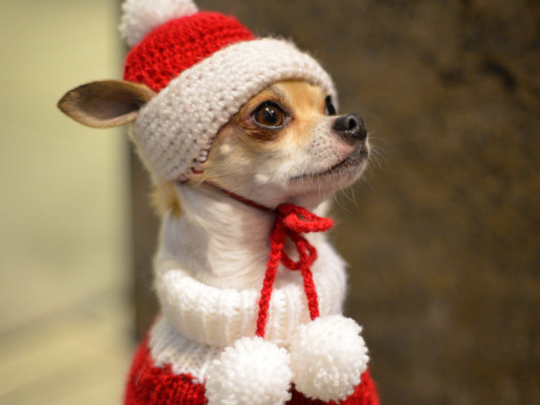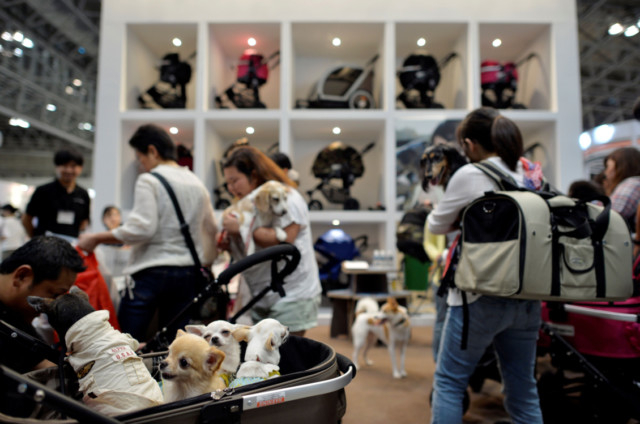
TOKYO: Forget the kids. What are you doing for your dog this Christmas? How are you going to celebrate with your cat?
That’s the question on the minds of many here in Japan, where, as in the United States, the number of pets far outstrips the number of children. And a candy cane-striped chew toy just isn’t going to cut it.
Take Ukyo Suzuki, who was shopping in the chichi Tokyo neighbourhood of Azabu-juban recently with Ichigo (Strawberry), her Pomeranian. Ichigo was wearing a hand-knit Santa suit that almost obscured her pink jewelled collar. Suzuki also sparkled, with diamantes on her fingernails and sequins on her Ugg boots.
“We’re planning a Christmas trip together,” said Suzuki, pointing to her husband and, of course, to Ichigo. They’re going to an onsen resort — a hotel with hot springs — in Shizuoka, the area surrounding Mount Fuji. And “they” means all three of them. The resort has special bath facilities for dogs, too.
“And on occasions like this, I like to cook a special meal for her so she knows it’s a special day,” Suzuki said while her husband tried to stop Ichigo from growling. This Christmas, Suzuki will make chicken stew with lots of vegetables — but no salt, which is bad for Ichigo’s health — and take it with them to Shizuoka.
Such measures may sound over-the-top, but for many in Japan, pets are replacing children.
More Japanese are choosing to marry later or not at all. A Health Ministry report released this year showed that the number of weddings last year was the lowest since the end of World War II.
That’s contributed to a fertility rate that is now about 1.4 — well below the 2.07 needed to sustain Japan’s population. If things continue this way, the population will plummet by almost a third by 2060.
That means that four-legged flurries are increasingly the “offspring” of choice. There are 16 million people younger than 15 living in Japan, but more than 20 million cats and dogs, according to the most recent figures from the Japan Pet Food Association.
“In Japan, pet owners consider pets to be their family members. Some treat them as if they were their children,” said Koichi Makino, the product sales department manager at Peppy, a pet supplies web site that offers Christmas cakes and Christmas gift sets for dogs.
“Many of our customers are couples without children,” said Makino, who has a pug named Hana (Flower). “They want to spend a happy life together and enjoy special events like Christmas and New Year’s together.”
This is not a Christian country, so Christmas is a purely commercial event celebrated pretty much entirely by young people and retailers. The hallmark of Christmas in Japan is sponge cake laden with cream and strawberries. (There’s certainly no mention of Hanukkah or Kwanzaa or other holidays with fewer marketing opportunities.)
Pet stores in the West don’t miss the chance to sell gifts for pooches, and here you can also buy beef biscuits for Fido and climbing towers for Whiskers. But Japan takes Christmas for pets to a whole new level.
Peppy is offering Christmas cakes that dogs and owners alike can enjoy, including the “Rudolph the Red-Nosed Reindeer,” a chiffon cake with Caspian yoghurt, cheese and cookies on top, at about $25 each (Dh91.82). The accompanying and declares: “An angel and a reindeer will deliver a dream on the holy night.”
For cases of canine lactose intolerance, there’s also a soy cream Christmas cake made with soy milk and sweet-potato paste and topped off with berries.
Tedukayama Wanbana, an Osaka shop specialising in additive-free dog food and cakes, is offering more appropriate dog fare: cakes and cupcake sets made of horse meat and vegetables. But they’re still done up to look like they came straight from a Parisian patisserie.
The “happy day” cake ($31) contains only 300 calories, and the shop will pipe the dog’s name onto it with frosting.
But it would be wrong to skip straight to dessert. Peppy also offers dinner packs for dogs, including chicken cream stew, grilled turkey with fruit sauce, gardenia rice, green salad and a cream puff. Just $28 a pop.
And that’s not even mentioning the New Year’s bento boxes for dogs, which look pretty much the same as the exquisite bentos made for humans.
One $30, three-tiered set includes delicacies including bonito-broth-rolled omelette, venison rage farfalle, lamb steak, roast chicken with tzatziki, pineapple fried rice and a mango éclair. The $55 “family set” can be enjoyed by both pet and owner and includes roast beef and mashed sweet potatoes with honey and chestnuts.
These offerings are part of a broader pet-care industry here, worth about $9 billion annually, according to figures from the Ministry of Internal Affairs and Communications.
It’s not unusual to see people pushing a dog, or three, in a stroller. Like baby strollers, they come in a wide variety, from the basic $80 model to the SUV-equivalent with air-filled tires and the option of facing forward or to the rear. The Primo “pet buggy” with bassinet function costs upwards of $400.
Dog groomers offer the usual shampoo and clipping services, but salons such as I Am Candy in Azabu-juban also offer reflexology and aromatherapy massages for dogs (from $15 for 15 minutes) and henna dying.
Of course, not all Japanese pet owners are celebrating the season with the four-legged members of their families.
Mark Kobayashi, out walking with Shun, a white Pomeranian-Chihuahua mix strapped to her chest in a baby carrier for dogs, shook her head when asked if the pup would hear jingle bells next week.
“No, we just celebrate his birthday,” she said. And what do they do for his birthday?
“Well, he likes cake, but only the ones for humans. And his favourite food is foie gras.”












